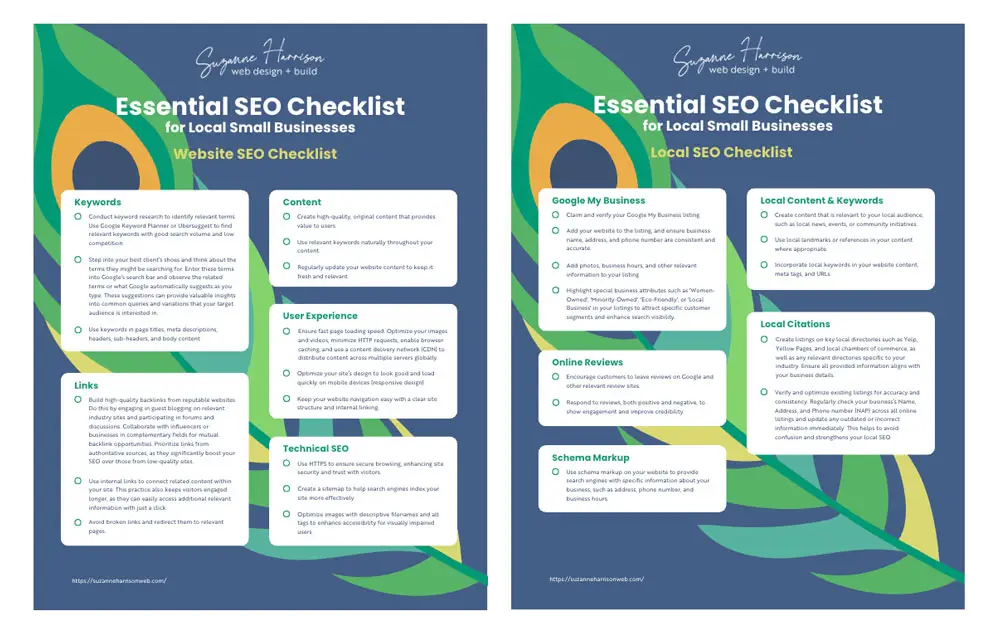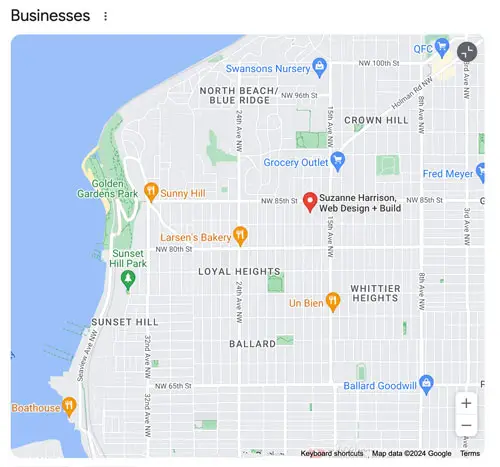Confused by SEO? My checklist can help.
As a local small business, your website is crucial to your success. So it’s vital that your website appears on the first page of search engine results. But how do you achieve this? Navigating the complexities of search engine optimization (SEO) can be overwhelming. And many small businesses find it challenging to achieve top rankings in search results and on Google Maps. That’s where my local SEO checklist comes in!

The Essential Local SEO Checklist
So where do you start? The Essential SEO Checklist will help you cover all the bases to improve your website’s visibility, attract more customers, and make a significant impact online. Designed specifically for local small businesses, this free checklist provides you with the guidance to effectively enhance your website’s search engine rankings.
So are you ready to optimize your site like a pro? Let’s dive in.
Covering both Website SEO and Local SEO
The Essential SEO Checklist for Small Businesses is strategically divided into two key areas:
- On the first page, the Website SEO Checklist encompasses the essential strategies to enhance your site’s global visibility and search engine ranking, focusing on technical improvements and content optimization.
- On the second page, the Local SEO Checklist targets optimizations specific to boosting your presence in local search results and map listings, crucial for businesses serving local communities.
Together, these sections help ensure your website reaches both a broad audience and your specific local market effectively

Help with keywords and search terms
Understanding which keywords to focus on is often the trickiest part of SEO. It’s not just about finding terms that are relevant to your business. It’s also about identifying the ones that your target audience is actually using in their searches. This process often requires tools for insights to pinpoint the best opportunities for your specific needs.
Helpful Resources:
- Google Keyword Planner: Start with Google’s own tools to find keywords related to your business and see how often they are searched.
- SEMrush Keyword Magic Tool: Dive deeper with SEMrush for comprehensive keyword research and competitive analysis.
- How to Do an SEO Competitor Analysis in WordPress: This article provides instructions and a helpful video to see what your competition is doing, and to use that information to improve your site’s SEO.
- Personalized SEO Assistance: If you need more personalized help or have specific questions about the local SEO checklist, don’t hesitate to reach out to me.
Glossary of SEO Terms
Need some help with the SEO terminology? If so, expand the section below to access a glossary of terms featured in the local SEO Checklist
Backlinks: Links from other websites to your website. High-quality backlinks can significantly boost a site’s credibility and ranking in search engine results.
CDN (Content Delivery Network): A system of distributed servers that deliver web content and pages to a user based on the geographic locations of the user, the origin of the webpage, and a content delivery server. CDNs help improve the speed and reliability of content delivery, which can positively impact SEO.
Google My Business: A free tool from Google that allows business owners to manage their online presence across Google, including Search and Maps. Helps enhance local SEO by providing business information directly to potential customers.
HTTPS (HyperText Transfer Protocol Secure): An internet communication protocol that protects the integrity and confidentiality of data between the user’s computer and the site. Websites using HTTPS have encrypted connections, which is a signal of trustworthiness and is favored by search engines.
Keywords: Words or phrases that users enter into search engines to find information. Websites should use relevant keywords in their content to improve their visibility for those searches.
Local Citations: Mentions of a business on other webpages, particularly in directories, and including the business’s NAP. Citations can help improve local SEO rankings.
Meta Tags: Snippets of text that describe a page’s content; the meta tags don’t appear on the page itself, but only in the page’s code. Important meta tags for SEO include the title tag and the meta description.
NAP (Name, Address, Phone Number): Critical business information that should be consistently listed across all online platforms to improve local search rankings and help customers find a business.
Page Speed: The measurement of how quickly content on your page loads. Improving page speed can enhance user experience and positively impact SEO rankings.
Responsive Design: An approach to web design that makes web pages render well on a variety of devices and window or screen sizes, ensuring that a site is accessible and user-friendly across all devices.
Schema Markup: A code (semantic vocabulary) that you put on your website to help search engines return more informative results for users. It can enhance the way your page displays in SERPs with rich snippets.
SEO (Search Engine Optimization): The practice of improving the ranking and visibility of a website in search engine results pages (SERPs), making it easier for users to find when searching for relevant topics.
SEO Audit: An evaluation of a website to see how well it is optimized for search engines. Audits typically assess the site’s architecture, links, content, and other elements that affect search engine visibility.
Sitemap: A file where you provide information about the pages, videos, and other files on your site, and the relationships between them. Search engines read this file to more intelligently crawl your site.
URLs (Uniform Resource Locators): Web addresses that are used to visit webpages. Including keywords in URLs can help improve a site’s SEO.
Download the Essential Local SEO Checklist for Small Businesses
By downloading this local SEO checklist, you can easily check off the essential tasks necessary for enhancing your website’s visibility and performance. If you partner with me to build your website, I’ll handle most of these tasks for you. I will also provide guidance, or connect you with trusted professionals for any additional help you may need.
Understanding this checklist is an important step towards effective local SEO. It will empower you to manage many tasks yourself and recognize when professional help is beneficial.
Ready to get started? Enter your email below to download the full checklist and begin optimizing your site today!